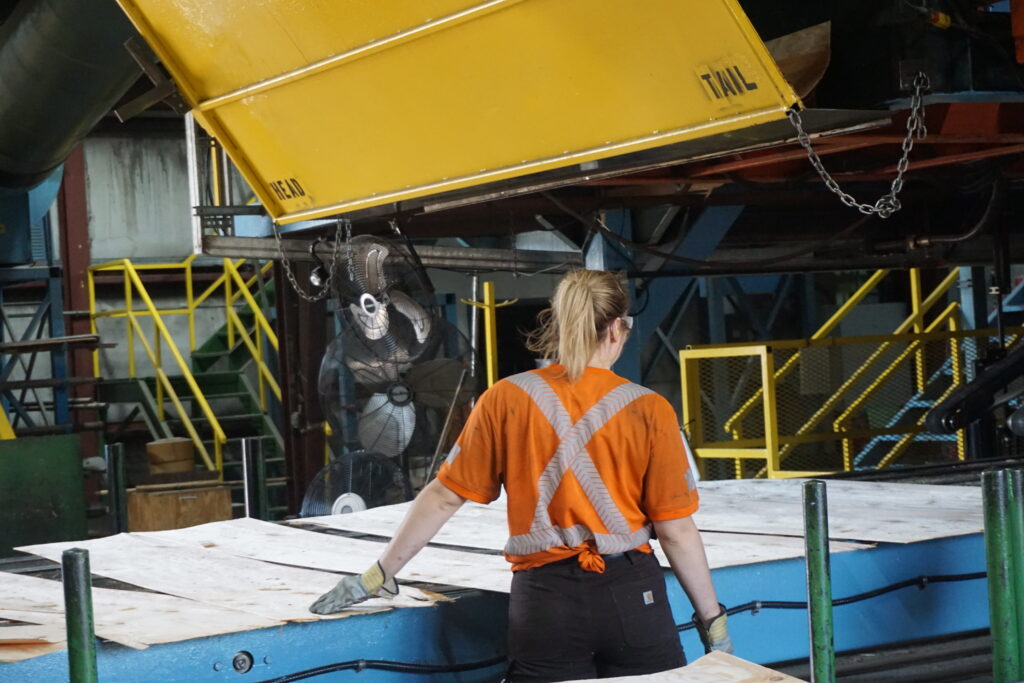
Features
Opinions
Features
Women in Forestry
International Women’s Day: Cultivating change
It is time to shed light on the transformative role that women, womxn, and individuals of all backgrounds play in Nova Scotia’s forestry industry.
March 8, 2024 By Heather Boyd
 Photo: Annex Business Media
Photo: Annex Business Media In the heart of Nova Scotia’s boreal forests, the Forestry Sector Council is sowing the seeds of a workforce that mirrors the rich diversity of the forests it aims to nurture. As the sector evolves with incessant challenges, changing seasons, and shifting market demands, it is time to shed light on the transformative role that women, womxn, and individuals of all backgrounds play in Nova Scotia’s forestry industry, particularly as we navigate and embrace this low-carbon era and the shift to ecological approaches to forest management.
In the intricate tapestry of forestry, the imperative need for a diverse, equitable, and inclusive workforce has never been more critical. The Forestry Sector Council, guided by its core values of collaboration, sustainability, and diversity, stands as a beacon of change in an industry traditionally seen as male-dominated. For too long, the narrative surrounding forestry has been one-dimensional. It’s time to dismantle stereotypes, break down barriers, and empower individuals of all genders, ages, races, and abilities to thrive in an industry that is not just about trees but about fostering a workforce as resilient and diverse as the very forests it sustains.
The council’s commitment to Diversity, Equity, Inclusion, and Accessibility is not just rhetoric; it is a rallying cry for action. By actively promoting careers in forestry as a space for everyone, the council is opening doors wider to a pool of talent. The industry’s transformation is not just about embracing diversity; it is about embracing a low-carbon era that opens conversations, demands innovation, and fresh perspectives of all people craving meaningful work.
Imagine a future where women, womxn, and all individuals contribute their unique perspectives to an industry at the forefront of ecological forestry practices. The low-carbon era necessitates a paradigm shift, and we need people to bring a fresh lens that aligns with the sustainability goals of our changing world.
Why “womxn”? It is one of a few lexical and social phenomena, including the adoption of ‘x’ in naming gender non-conforming individuals, genderqueer folxs, two spirit people, femmes, transgender folxs, and non-binary people. Womxn acknowledges that gender identity exists in a sphere and one word has room for multiple gender expressions without weighing one more important than another. To ensure accessibility for all people, the council is actively engaged in providing human resource support for small- and medium-sized enterprises (SMEs). Recognizing the struggling owner/operator contractors, and that not all businesses have dedicated human resource departments, the council steps in to bridge the gap, offering guidance, best practices, and supports to ensure employers have the tools and guidance needed to foster diverse and inclusive workplaces.
As we navigate through a period of workforce shortage and departure of workers due to retirements, the urgency of this mission is underscored. To fill these gaps, we must tap into the full spectrum of talent available, ensuring that no one is left behind in the transition to a low-carbon future.
Strategic training opportunities form another cornerstone of the council’s approach. By encompassing the entire supply chain, the Forestry Sector Council is equipping the workforce with the skills and knowledge needed to navigate the challenges of tomorrow during the shift to ecological forestry in a carbon-conscious manner. Through this, all humans are not only welcomed into the industry but are provided with the tools to excel in a sector that champions sustainability.
We implore readers to embrace this transformative journey. The forests of Nova Scotia stand as a living testament to the beauty of diversity and interconnectedness. It’s time for the forestry industry to mirror this beauty, fostering an environment where every individual, regardless of gender or background, can grow and thrive in a low-carbon era.
Let’s embark on a journey of empowerment, breaking down stereotypes, and building a forestry sector that not only embraces diversity but actively promotes careers aligned with the principles of the low-carbon era. The future of Nova Scotia’s forests and its workforce depends on this holistic commitment to change.
 Heather Boyd is the executive director of Nova Scotia’s Forest Sector Council. She is the first female chair on the Maritime College of Forest Technology’s board of governors
Heather Boyd is the executive director of Nova Scotia’s Forest Sector Council. She is the first female chair on the Maritime College of Forest Technology’s board of governors
Remember to join us for the Women in Forestry Virtual Summit on Mar. 8 at 11 am ET/8 am PT! It’s FREE to register. Sign up now!
Print this page